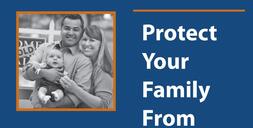Why IRC Practices are Required in Vermont
Lead is a highly toxic metal that was used in house paint until 1978. About 60% of Vermont homes were built before then.
Lead-based paint includes any paint, coating, stain or seal made before 1978. Lead-based paint becomes dangerous when it's damaged and turns into dust. This dust can be breathed in or swallowed, especially by children and pregnant people, and can cause permanent health effects. Learn more about lead poisoning
To help prevent lead poisoning, Vermont law requires owners of rental housing and child care facilities built before 1978 to perform Inspection, Repair and Cleaning (IRC) Practices and to file a compliance statement each year.





